
INOMICS Salary Report
Which economists are paid the most, and where?
Read a summary using the INOMICS AI tool
The following article first appeared in the INOMICS Handbook 2023.
Around the world, economists are paid well compared to other occupations. This may not be a surprise, but how much economists are paid, how different employers compare in terms of pay, and other factors (such as “is an economics PhD worth the pay increase?”) may be less clear to burgeoning economists.
This article will shed some light on these questions and more using our data from the 2022 INOMICS Salary Report. Read on to learn more about which employers pay economists the most, regional differences in economist salaries, and more.
This article will discuss both academic and non-academic (or “industry”) economists. If you’re curious about the differences between these two general types of economists, you should read our article written by an economist who has worked in both spheres, “Policy or academic economist: which should I become?”.
Regardless of an economists’ chosen path, how much can one expect to earn, and which economists earn the most?
An Overview of Economist Salaries Globally
As mentioned above, many organizations value the specialized skills that economists bring to the table. The below graph constructed from our 2022 Salary Report data shows how average economist pay varies by these different types of employer around the world:
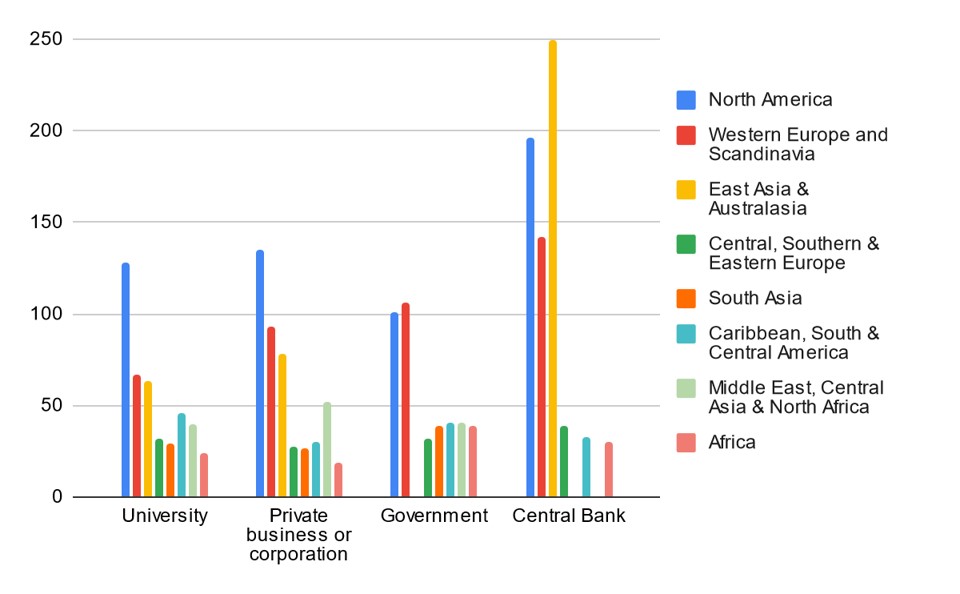
Figure 1: Regional average salaries by employer type (USD, PPP-adjusted, thousands)
Figure 1 shows average economist salaries by each type of employer in different regions around the world (note that a handful of series are excluded due to sample size issues, i.e. NGO in East Asia & Australasia). Two things stand out from this figure. First, average pay in North America is very high, while average pay in Western Europe & Scandinavia and East Asia & Australasia are the next highest on average. The other regions of the world are more comparable with each other (we will explore each region individually later on in the article).
Second, central banks appear to pay economists the most on average. Readers might be interested in the very high central bank salaries in East Asia & Australasia; the entire sample of central bank economists from the region in our survey are located in Hong Kong, which is a high-paying city in its part of the world. Private businesses and governments also pay quite well in general, with the exception that government pay in North America appears to be lower than other options there. Meanwhile, research institutions and NGOs appear to pay the least, though the difference is not stark.
While this graph is interesting, one important detail is left out that can skew the results. More educated economists are paid more highly, so the proportion of PhD-holding economists in each role should be accounted for as well to get an even more accurate picture of economist pay.
Salary Breakdown by Type of Employer and Level of Education
Some employers, like central banks, are more likely to require an economics PhD. Thus, on average these employers offer higher salaries for their highly educated workforce. On this basis, it is useful to differentiate between the level of education when comparing salaries offered by different types of employers. This breakdown can be seen for each region in the following Figures 2 – 9.
Note that our survey data lacks a sufficient sample size of Bachelor’s degree respondents to subdivide Bachelor’s economists by employer type. This is partially because most economists attain at least a Master’s degree; it is rare, though not impossible, for an economist to develop their career with only a Bachelor’s degree.
These salaries are presented in thousands of USD, and were converted using purchasing power parity data taken from the World Bank1 (PPP conversion accurate as of January 20, 2023).
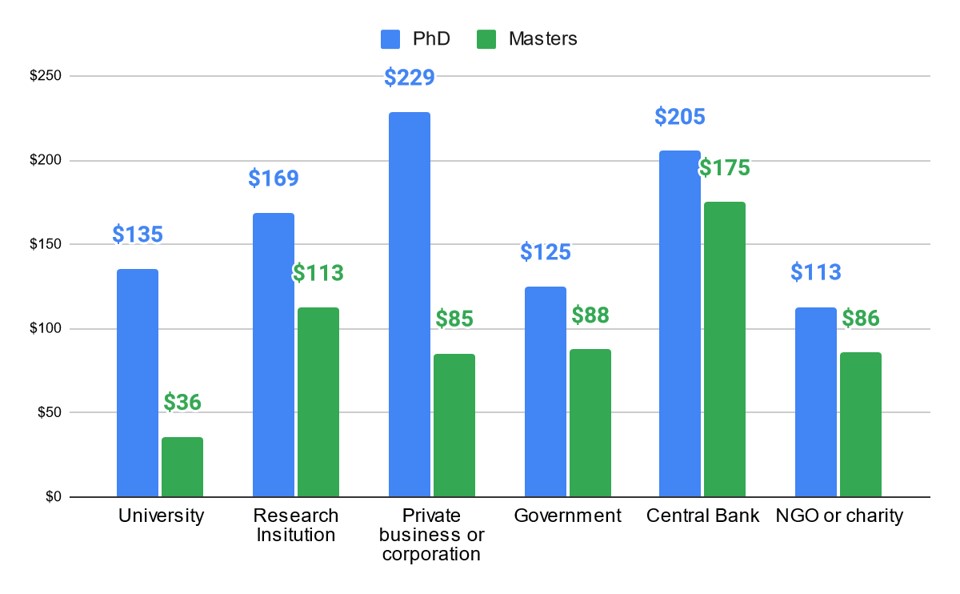
Figure 2: Average salary by position and degree in North America (USD, PPP-adjusted, thousands)
In North America, a PhD in economics has a clear payoff in terms of salary, especially for university and private business positions. Government, NGO, and research institution roles pay less of a premium for PhDs, but even these still pay roughly 35-40% higher salaries to PhDs than for Master’s degree holders. The lowest pay gap is at central banks, but these institutions tend to hire only accomplished economists with many years of experience. Getting a job at a central bank with only a Master’s degree likely requires extensive years of experience that early-career economists don’t have.
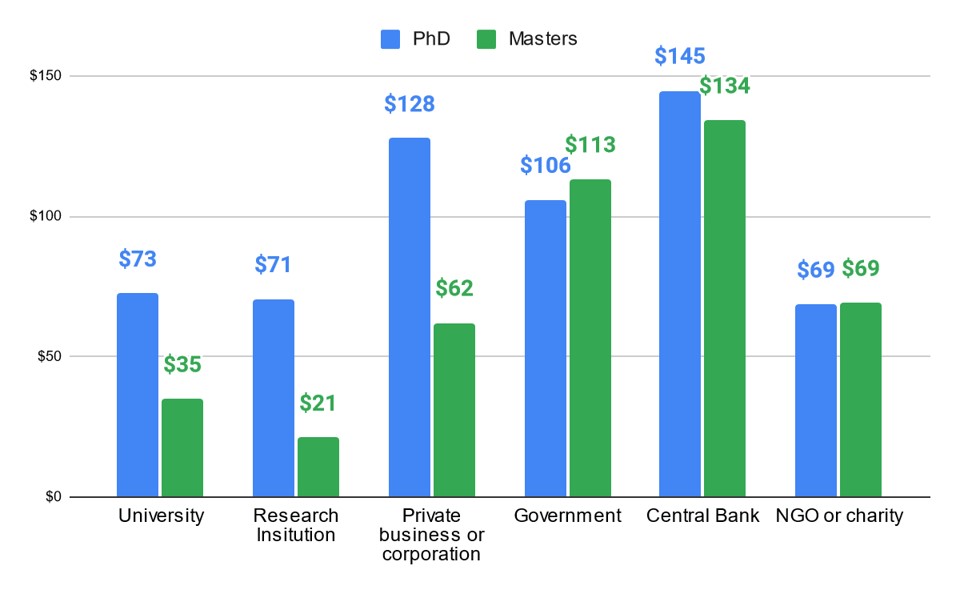
Figure 3: Average salary by position and degree in Western Europe and Scandinavia (USD, PPP-adjusted, thousands)
In Western Europe and Scandinavia, a PhD in economics also has a clear payoff in terms of salary for university, research institution, and private business positions. However, other roles feature less pronounced differences. Economists who wish to work in government or in an NGO in Western Europe ought to examine the local conditions and the payoff of a PhD in their country and subdiscipline to assess if it’s worth it. Central banks also do not appear to pay a premium for PhD economists in this region, but again these institutions tend to hire economists with many years of experience, so getting a job at one with only a Master’s degree as an early-career economist might be difficult.
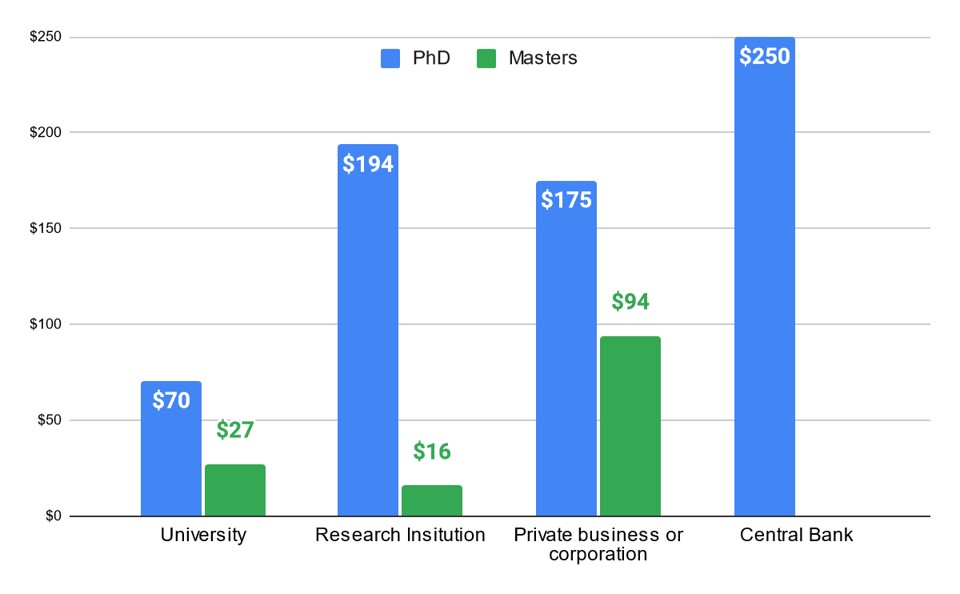
Figure 4: Average salary by position and degree in East Asia & Australasia (USD, PPP-adjusted, thousands)
In East Asia and Australasia, economists with a PhD enjoy a significant pay increase in university, research institution, and private business positions. Central banks once again pay the most for economists in this region, though no central bankers with a Master’s degree responded to the survey in this region, perhaps suggesting that central banks are less likely to hire economists without a PhD in East Asian / Australasian countries. In this region, a PhD appears to be well worth the investment of time and effort. NGO or charity and government roles are not included due to small sample size.
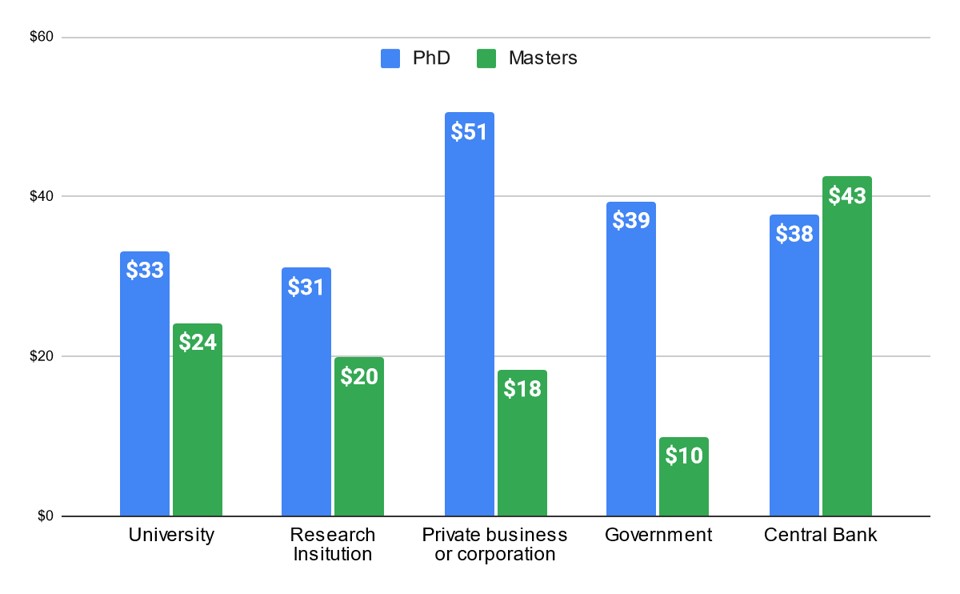
Figure 5: Average salary by position and degree in Central, Southern & Eastern Europe (USD, PPP-adjusted, thousands)
In Central, Southern and Eastern Europe, starting a career as an economist with only a Master’s degree is feasible, but a PhD is an excellent investment in terms of salary. Almost every employer type in this region pays a premium for an economics PhD. An interesting exception are central banks, which actually feature higher average pay for economists with a Master’s degree. Again, it’s important to note that getting a job at a central bank usually requires years of experience and demonstrated expertise; it’s possible that central banks in this region do not emphasize a PhD as strongly as extensive work experience when recruiting economists. NGO and charity roles are excluded due to small sample size.
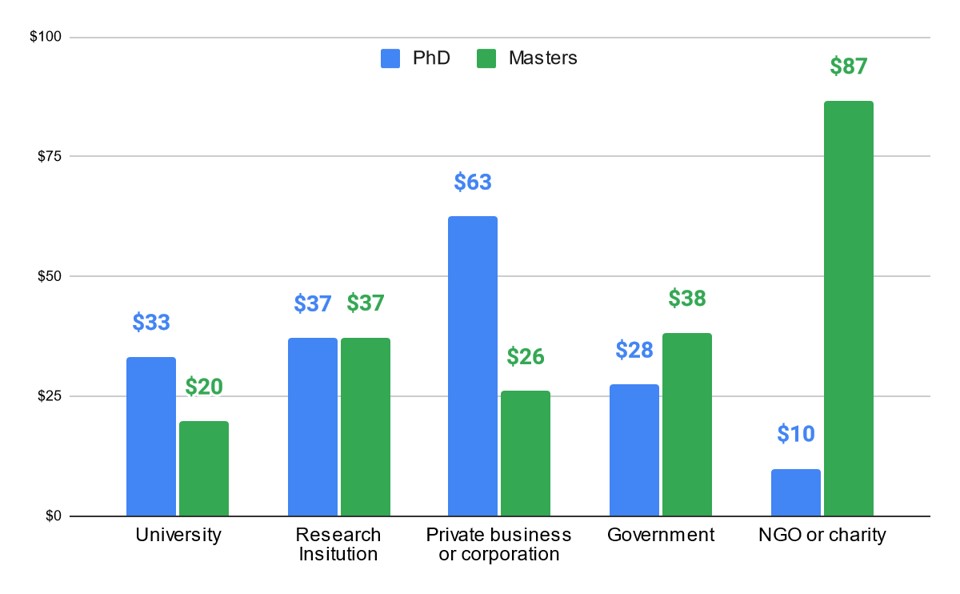
Figure 6: Average salary by position and degree in South Asia (USD, PPP-adjusted, thousands)
In South Asia, universities and private businesses pay a (relative) premium for economists with a PhD. Economists in these roles stand to gain much from pursuing a PhD. Meanwhile, Research institution pay is about equal for economists with a Master’s or a PhD. A large amount of highly-paid, Master’s degree-holding economists in NGO and charity roles work in this region. In fact, the highest paid role in these regions appear to be for those types of economists. This could be due to foreign investment or aid programs, which typically spend money on projects that industry economists – not academic ones – would manage, or other factors. Central bank roles are not reported here due to small sample size.
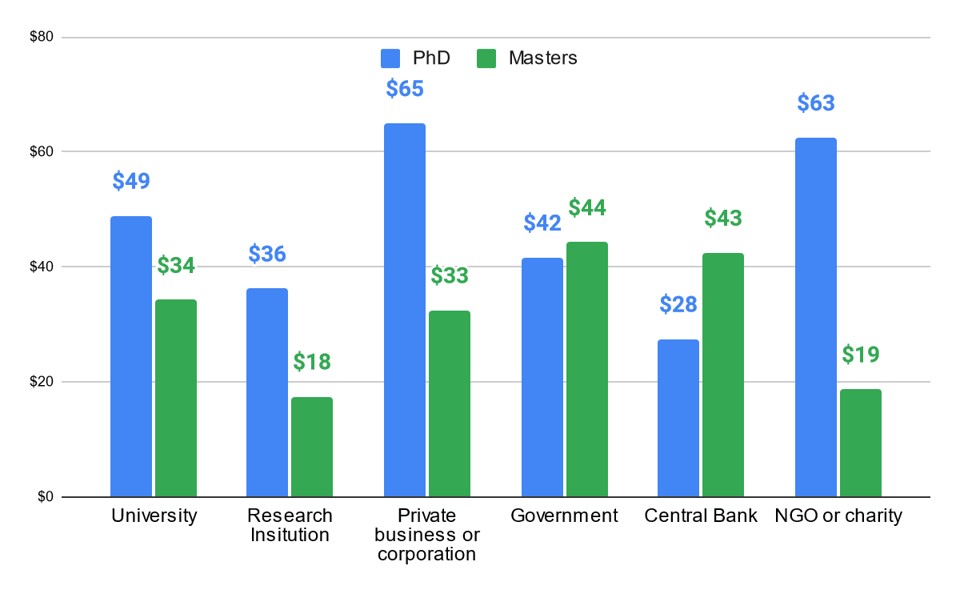
Figure 7: Average salary by position and degree in Caribbean, South & Central America (USD, PPP-adjusted, thousands)
In the Caribbean, South America, and Central America, a PhD in economics appears to be a worthwhile investment. Almost every position pays a premium for an economist with a PhD in this region; those at private businesses and NGOs or charities stand to gain the most from attaining a PhD. One exception is government roles, where economists with a Master’s degree slightly out-earn PhD economists on average.
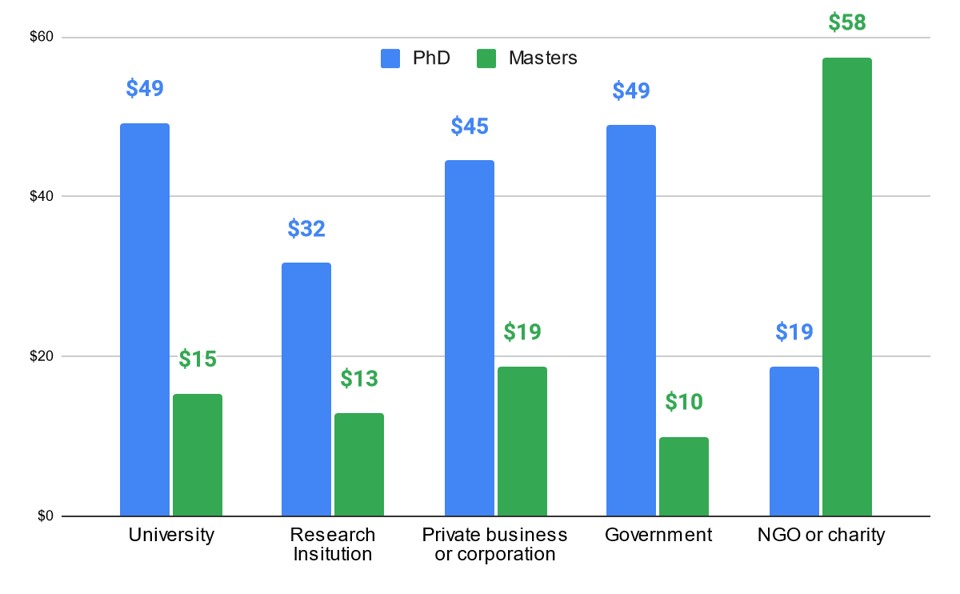
Figure 8: Average salary by position and degree in Middle East, Central Asia & North Africa (USD, PPP-adjusted, thousands)
The Middle East, Central Asia, and North Africa is similar to the Caribbean, Central and South America region. Here too, a PhD in economics pays off very well. Every employer except for NGOs pay a premium for an economist with a PhD in this region. The highest earners appear to be PhD economists in universities and in government, alongside Master’s degree holders in NGOs. But, in this region NGO pay is very high. Like with South Asia, it’s possible this is due to foreign aid or investment being sent for projects or investments that are closely related to industry economists’ jobs, which in general may not require as much education as academic economist roles.
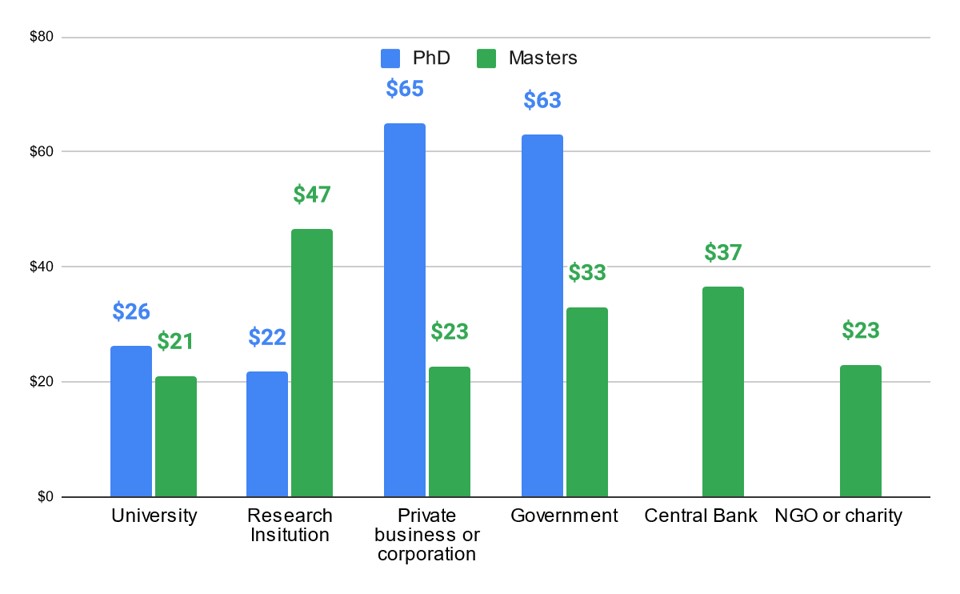
Figure 9: Average salary by position and degree in Africa (USD, PPP-adjusted, thousands)
Africa is a unique region when it comes to economist pay. Pay in government and for private companies follows a similar pattern as other regions, where a PhD in economics grants a sizeable increase in pay. Universities still follow this pattern, though pay at universities in African countries typically appears lower compared to other economist jobs in Africa relative to the rest of the world. Besides this, economists with a Master’s degree earn decent pay in other roles. Unless one wishes to work for the government or a private organization in Africa, a Master’s degree in economics might be sufficient.
The most highly paid academic economists out-earn most industry economists
It may appear from these graphs that academic economists earn less money than their counterparts in industry. While the value of a PhD is clear in certain cases, like with high private company pay, it might not be clear whether it’s worth it pay-wise to enter academia.
However, these averages by employer type mask one important fact: professors of economics earn much more money than non-professor-level economists employed at universities. In fact, professors of economics earn salaries that are comparable to the highest earners in industry. This can be seen below in Figure 10:
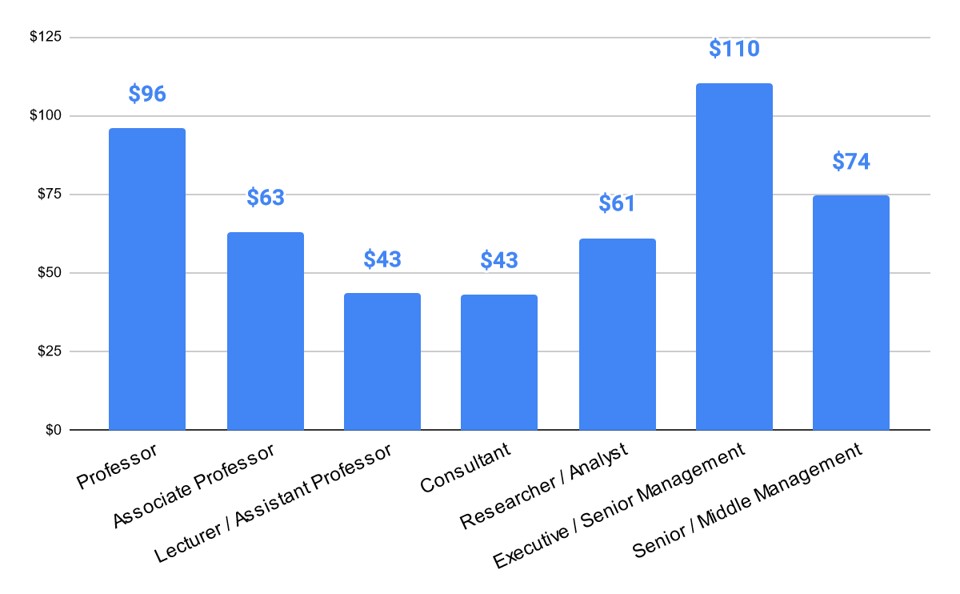
Figure 10: Average salaries for economist jobs globally (USD, thousands, PPP-adjusted)
Figure 10 shows that industry positions pay more than academic positions on average, but economics professor (and to a lesser extent, associate professor) salaries are comparable to high-paying industry positions. Professors of economics on average are only outpaid by executive leadership roles.
Thus, new economics PhDs should not be discouraged from entering academia by somewhat lower salaries shown in the regional breakdowns. Although industry economists will out-earn most academics in junior roles, a full professor of economics salary makes up the difference, only out-earned by executive leadership roles.
Are you curious to learn more about economist salaries? Help INOMICS analyze even more about the state of pay in economics by answering our anonymous Salary Survey. It only takes a couple of minutes and is available here: https://inomics.com/salary-survey. After answering the survey, you’ll have the option to subscribe for early access to the results, published in the fourth quarter of each year.
And if you’re looking to take the next step in your career as an economist, we can help. Check out available courses, jobs, and programs to find the next skill, degree, or job in your path as an economist. No matter your choice of degree or position, economists have much to offer – and their compensation often reflects their valuable skills, and the contributions they make to the economy, and society, around them.
The above article first appeared in the INOMICS Handbook 2023, which you can download on our site.
Header image credit: wirestock on Freepik.de.
Sources:
1: https://data.worldbank.org/indicator/PA.NUS.PPP. PPP data originally accessed on January 20, 2023. PPP data may have changed since that date.
-
- Postdoc Job
- (Remote)
- Posted 2 weeks ago
Vacancy for a Postdoctoral fellow
At University of Ghent in Gent, Belgique
-
- Conférence
- Posted 3 weeks ago
Industrial Policies in a Globalized and Financialized World
Between 7 May and 8 May -
- Postdoc Job
- Posted 1 week ago
Postdoctoral Researcher (all genders welcome)
At Georg-August-Universität Göttingen in Allemagne










